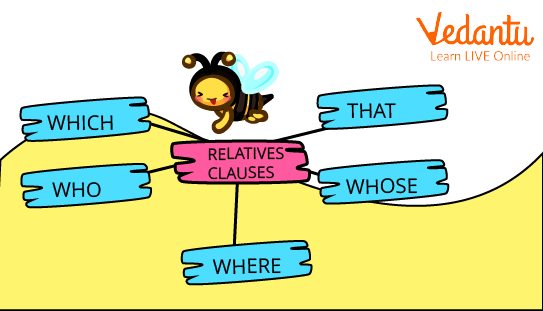An Overview of Class 9 English Grammar Ncert Solutions Clauses
FAQs on Class 9 English Grammar Ncert Solutions Clauses
1. What are the most frequently asked types of questions on Clauses in the Class 9 English exam for 2025-26?
For the Class 9 English exam, questions on Clauses typically focus on three main areas. These are the most important question types to practise:
- Identification: You will be given a sentence and asked to identify the main clause and the subordinate clause, and further name the type of subordinate clause (Noun, Adjective, or Adverbial).
- Combining Sentences: You might be given two simple sentences and asked to combine them into a single complex sentence using a specific type of clause.
- Fill in the Blanks/MCQs: You may need to complete a sentence by choosing the correct clause or conjunction from multiple options.
2. Which types of clauses are considered most important for scoring full marks in Class 9 grammar questions?
While all clauses are part of the syllabus, exam questions frequently test your understanding of the three types of Subordinate (or Dependent) Clauses. To score well, you must master:
- Noun Clauses: Crucial for understanding sentence structure as they function as a noun.
- Adjective (or Relative) Clauses: Important for describing nouns, with questions often focusing on the correct use of relative pronouns like 'who', 'which', 'that', and 'whose'.
- Adverbial Clauses: These carry significant weightage as they have many subtypes (time, place, reason, condition, etc.), offering a wide range of potential questions.
3. How can I correctly identify a Noun Clause in a sentence to answer a 1-mark exam question?
To quickly and correctly identify a Noun Clause in an exam, use the 'what' or 'it' replacement trick. A Noun Clause typically answers the question 'what?'. Try replacing the entire clause with the word 'what' or 'it'. If the sentence still makes grammatical sense, you have found the Noun Clause. For example, in the sentence "I know that he is honest," you can ask "I know what?" The answer, "that he is honest," is the Noun Clause.
4. What is the key difference between an Adjective Clause and an Adverbial Clause, a common point of confusion in exams?
The key difference lies in what they modify. This distinction is critical for important identification questions.
- An Adjective Clause (or Relative Clause) always modifies a noun or a pronoun in the main clause. It answers questions like 'which one?' or 'what kind?'. Example: "This is the house that Jack built." (modifies the noun 'house').
- An Adverbial Clause always modifies a verb, an adjective, or another adverb in the main clause. It answers questions like 'when?', 'where?', 'why?', or 'how?'. Example: "He left when the sun set." (modifies the verb 'left').
5. What kind of Multiple Choice Questions (MCQs) can be expected from the Clauses chapter?
MCQs on Clauses usually test your ability to quickly identify clause types or use the correct conjunction. Expect questions like:
- Identifying the underlined clause in a sentence (e.g., Noun, Adjective, Adverbial).
- Choosing the correct subordinating conjunction (like 'because', 'although', 'if', 'when') to complete a sentence.
- Identifying the sentence that correctly combines two simple sentences using a clause.
6. How is the knowledge of Main and Subordinate clauses tested in sentence transformation or synthesis questions?
In sentence transformation or synthesis questions, your knowledge of clauses is tested on a practical level. You won't just identify clauses; you'll have to build sentences with them. An important question format involves being given two simple sentences, for instance: "He is very intelligent. Everyone knows this." You would be asked to combine them into one complex sentence, which requires you to turn one sentence into a subordinate clause: "Everyone knows that he is very intelligent." This tests your ability to use clauses to create more complex and meaningful sentences, a key skill for higher marks.
7. Why do students often confuse Adverbial Clauses of Reason (e.g., 'because') with Adverbial Clauses of Time when the conjunction 'since' is used?
This is a common conceptual trap in exams because the word 'since' can indicate both time and reason. To avoid this error, ask what question the clause answers:
- For Time: 'Since' refers to a point in time from which an action has continued. Example: "He has been ill since he returned from the trip." (Answers the question 'Since when?').
- For Reason: 'Since' is used as a synonym for 'because'. Example: "Since it is raining, we cannot go out to play." (Answers the question 'Why?').
Focusing on the question it answers is the most reliable strategy to secure marks.
8. Besides identification, what are some higher-order thinking (HOTS) questions that could be framed using Relative Clauses?
A HOTS question on Relative Clauses would move beyond simple identification. An important exam question might ask you to distinguish between defining and non-defining relative clauses. For example, you could be given a sentence like "My brother who lives in Delhi is a doctor" and asked to rewrite it to imply the speaker has only one brother. The correct answer would use a non-defining clause with commas: "My brother, who lives in Delhi, is a doctor." This tests a deeper understanding of how commas change the meaning of a sentence.
9. Why is mastering clauses important for the writing section (e.g., story writing, descriptive paragraphs), not just for grammar questions?
Mastering clauses is crucial for the writing section because it allows you to move beyond simple, choppy sentences. Using a variety of clauses (Noun, Adjective, Adverbial) helps you to:
- Add Detail and Depth: Use adjective clauses to describe characters and settings vividly.
- Show Cause and Effect: Use adverbial clauses of reason to explain motivations in a story.
- Create Complex Sentences: Varying your sentence structure makes your writing more engaging and sophisticated, which can lead to higher marks in descriptive and narrative tasks.






































